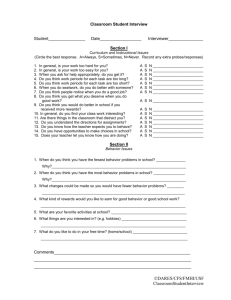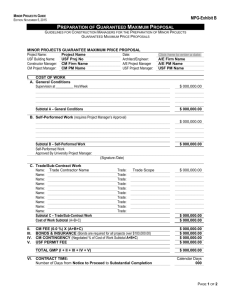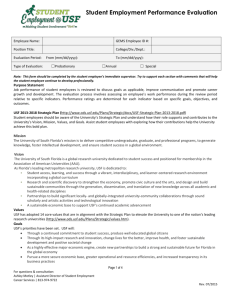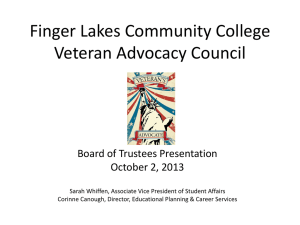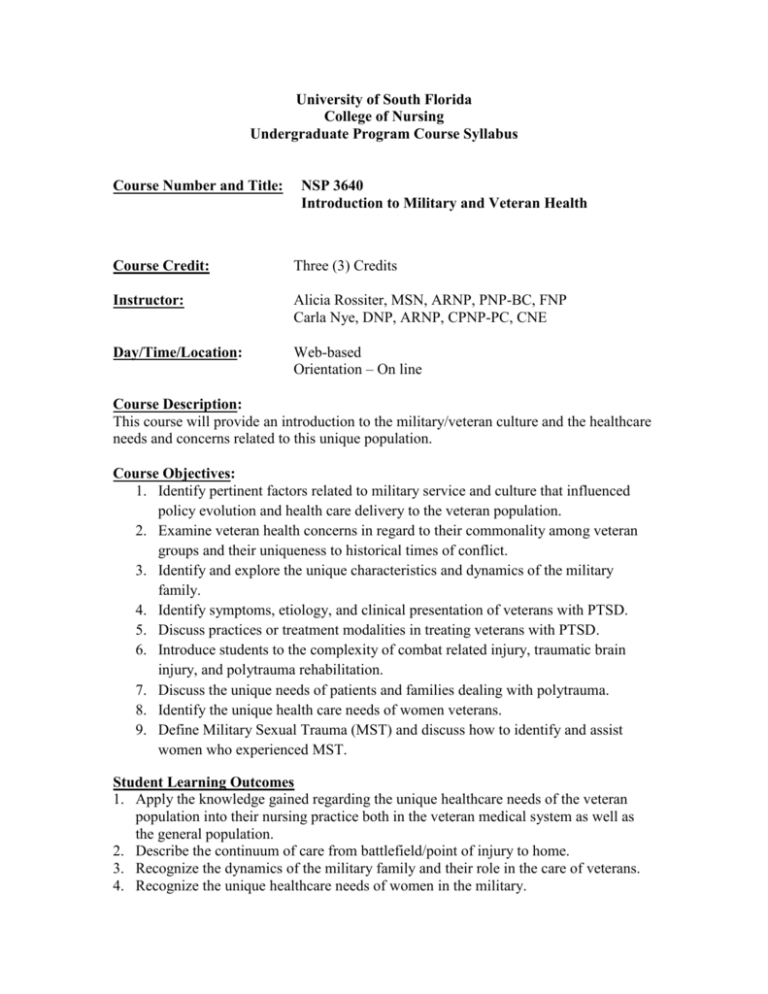
University of South Florida
College of Nursing
Undergraduate Program Course Syllabus
Course Number and Title:
NSP 3640
Introduction to Military and Veteran Health
Course Credit:
Three (3) Credits
Instructor:
Alicia Rossiter, MSN, ARNP, PNP-BC, FNP
Carla Nye, DNP, ARNP, CPNP-PC, CNE
Day/Time/Location:
Web-based
Orientation – On line
Course Description:
This course will provide an introduction to the military/veteran culture and the healthcare
needs and concerns related to this unique population.
Course Objectives:
1. Identify pertinent factors related to military service and culture that influenced
policy evolution and health care delivery to the veteran population.
2. Examine veteran health concerns in regard to their commonality among veteran
groups and their uniqueness to historical times of conflict.
3. Identify and explore the unique characteristics and dynamics of the military
family.
4. Identify symptoms, etiology, and clinical presentation of veterans with PTSD.
5. Discuss practices or treatment modalities in treating veterans with PTSD.
6. Introduce students to the complexity of combat related injury, traumatic brain
injury, and polytrauma rehabilitation.
7. Discuss the unique needs of patients and families dealing with polytrauma.
8. Identify the unique health care needs of women veterans.
9. Define Military Sexual Trauma (MST) and discuss how to identify and assist
women who experienced MST.
Student Learning Outcomes
1. Apply the knowledge gained regarding the unique healthcare needs of the veteran
population into their nursing practice both in the veteran medical system as well as
the general population.
2. Describe the continuum of care from battlefield/point of injury to home.
3. Recognize the dynamics of the military family and their role in the care of veterans.
4. Recognize the unique healthcare needs of women in the military.
Topical Outline:
DEFINING THE VETERAN
1. Definition of veteran
2. Military services and branches
3. Military demographics
4. Military culture
EVOLUTION OF THE VETERAN HEALTH CARE SYSTEM
1. Revolutionary War through OIF/OEF
2. Current Veteran health care system policy
VETERAN HEALTH CONCERNS ACROSS THE LIFESPAN
1. Age specific population competencies
2. Conflict specific health care issues
THE MILITARY FAMILY
1. Military family culture
2. The effects of deployment and reintegration on the military family
3. Resources for the military family
POLYTRAUMA
1. Combat Injury
2. Evacuation
3. Levels of care
4. VA Polytrauma System of Care
5. Rehabilitation
PTSD
1. PTSD: Overview
2. Impact of PTSD on veteran and family
3. Treatment modalities and practices used in treating veterans with PTSD
WOMEN VETERANS: A GROWNING POPUATION WITH UNIQUE NEEDS
1. Women in the military: Overview
2. Special health issues
MILITARY SEXUAL TRAUMA
1. Military Sexual Trauma: overview
2. Health Issues related to MST
3. Combating MST
Course Expectations:
This is a Web-Based Course available on Blackboard. It is necessary that you have access
to a computer that has software access to PowerPoint or PowerPoint Reader and that you
have an established HSC Email Account. Microsoft Word is the word processing
program required by the University and is the format required for all written assignments
submitted for a grade in this course. Blackboard 9: Firefox web browser is recommended
as your browser. www.Mozilla.com/firefox. You can also use I.E. 8 or Safari. If you need
assistance, please contact Health IT. 813 - 974-6288.
It is expected that the learners will demonstrate initiative in seeking learning experiences
that will enable them to achieve the course objectives. This includes reviewing all
modules, reading required readings, participating in on-line discussions and completing
all requirements by the assigned dates. Each student is responsible for notifying faculty if
unable to meet any of these requirements
Faculty will be available by email, telephone and by appointment in the Tampa office.
Email will be considered the communication method of choice. Please email with
suggested dates and times for Tampa in-office appointments – confirmation will be sent.
Phone appointments may also be arranged using the same email method. Emails will be
reviewed daily Monday through Friday. If an email message requires a response, the
student should receive that response within 48 hours. If the student has not received that
response within the 48 hour time frame, please email again.
A general discussion board will be used to facilitate communication with and among
faculty and students. This discussion board will also be reviewed Monday through
Friday unless student notified otherwise.
Student Expectations:
Assignments are due on or before the posted due date for summative evaluation. (Please
check the class schedule for specific information and deadline dates). There will be no
assignments for extra credit.
Submission of course materials: All course materials must be submitted through the
assignment section of BlackBoard.
Return of course materials: Course materials will be returned in several ways: 1) they
may be scanned and files attached to the assignment section 2) completed on line and file
attached to the assignment section (where you submitted). Please be aware that this is an
alternative method when there are time constraints. Papers will be retained for one month
after completion of the semester after which they will be shredded.
Evaluation Methods:
Quiz
Discussion boards
Case studies
Power point presentation
Scholarly paper
Grading Scale:
A
93-100%
B
84-92%
C
75-83%
D
67-74%
F
66 and below
Teaching Strategies:
Web-based Lectures
Blackboard Discussion
Curriculum-based projects
Mandatory Check-in Policy for Web-based Classes
Students enrolled in web-based classes must check in by sending an email to the lead
faculty confirming that you will be taking the course by Friday at 5 pm in the first week
of the semester. Failure to do so will result in the student being dropped from the class.
Withdrawal Policy
Withdrawal Policy (approved Faculty Council 12/15/06; revised 1/19/07)
Withdrawals are limited to 1 per course, with a limit of 2 per undergraduate or graduate
program. Withdrawals are defined as officially withdrawing from any class after the
Drop/Add period, and before the final Withdrawal date as outlined in the Academic
Calendar. Any student withdrawing in excess of stated policy may be dismissed from the
College of Nursing, unless the College of Nursing has pre-approved a documented
Medical and/ or Emergent situation.
Incomplete Guidelines
Definition: An incomplete grade (“I”) is exception and awarded at the instructors
discretion only when students are unable to complete course requirements due to illness
or other extenuating circumstances beyond their control. This applies to all gradable
courses, including pass/fail (S/U).
Students may be eligible for an “I” when:
Majority of the student’s work for a course has been completed before the end of the
semester
The work that has been completed must be qualitatively satisfactory
The student has requested consideration for an “I” grade as soon as possible but no
later than the last day of finals week.
.
University Policy on Religious Observance:
No student shall be compelled to attend class or sit for an examination on a day or time
prohibited by his or her religious belief. In accordance with the University policy on
observances of religious days, students are expected to notify their instructors if they
intend to be absent for a class or announced examination prior to the scheduled meeting.
Student Disability Services:
Student Disability Services exists to ensure that students with disabilities have the
technical, academic, and emotional support necessary to achieve academic and personal
success. The Office obtains and maintains disability-related documentation, certifies
eligibility for services, determines reasonable accommodations and ensures the provision
of services. “Students in need of academic accommodations for a disability may consult
with the office of Students with Disabilities Services to arrange appropriate
accommodations. Students are required to give reasonable notice prior to requesting an
accommodation.” For more information please visit the Students with Disabilities
Services (SDS) website at http://sds.usf.edu.
Resale of Class Materials
The sale of class recordings or notes is not permitted.
Institutional Guidelines
Nursing Academic Policies and Procedures:
http://health.usf.edu/nocms/nursing/pdfs/Baccalaureate_Handbook.pdf
USF Undergraduate Catalog 2012-2013:
http://www.ugs.usf.edu/catalogs/catdl.htm
USF Academic Policies and Procedures:
http://www.ugs.usf.edu/pdf/cat1213/08ACADEMICPOL.pdf
Disruption of Academic Process, USF Regulation 3.025:
http://generalcounsel.usf.edu/regulations/pdfs/regulation-usf3.025.pdf
Disruption of the academic process will not be tolerated.
Academic Integrity, USF Regulation 3.027:
http://generalcounsel.usf.edu/regulations/pdfs/regulation-usf3.027.pdf
Violations of policies regarding academic integrity will not be tolerated. Plagiarism will
not be tolerated and is grounds for failure.
The University has an account with an automated plagiarism detection service
(SafeAssign) which allows instructors and students to submit student assignments to be
checked for plagiarism. The instructor reserves the right to 1) request that assignments be
submitted as electronic files and 2) submit student’s assignments to SafeAssign, or3)
request students to submit their assignments through SafeAssign through my USF.
Assignments are compared automatically with a database of journal articles, web articles,
the internet and previously submitted papers. The instructor receives a report showing
exactly how a student’s paper was plagiarized.
Student Grievance Procedure, USF Policy 10-002:
http://generalcounsel.usf.edu/policies-and-procedures/pdfs/policy-10-002.pdf
Campus Closure Policy:
Emergency Preparedness for Academic Continuity
http://www.usf.edu/h1n1/emergency-preparedness-for-academic-continuity.asp
Holidays and Religious Observances, USF Policy 10-045:
Review USF attendance Policy for the Observance of Religious Holidays by student at:
http://generalcounsel.usf.edu/policies-and-procedures/pdfs/policy-10-045.pdf
Students who anticipate the necessity of missing any exam due to the observance of a
major religious observance should provide notice of the date/s to the instructor, in
writing, by the second class meeting.
Library Resources:
USF Library Resources and Services: http://lib.usf.edu
Shimberg Health Sciences Library: http://library.hsc.usf.edu
Shimberg Health Library Tutorials: http://library.hsc.usf.edu
(Follow links under Instructional Services section)
Citing Sources (APA 6th Edition) Guidelines and Examples:
http://lib.usf.edu/citing-sources/apa/
http://owl.english.purdue.edu/owl/resource/5601
Required Textbooks:
There is no required textbook. Selected web sources and readings will be available for the
student to access within the individual modules.
Access to the internet with a reliable computer is required. Microsoft Word 2003 or later
(2007 or 2010 preferred). Free download available from http://openoffice.org.
Blackboard functions best using the Mozilla internet browser.
The schedule, policies, and assignments in this course are subject to change in the
event of extenuating circumstances or by mutual agreement between the faculty and
students.
Start
Here
Topic
Start Here
1
Overview of Military and Veteran
Health Care
1
2
2
4
Age Specific Competencies of the
Veteran Population
5
Potential Conflict Related Health
Care Issues
6
7
8
5
11
12
7
13
14
8
Family Systems Theory
Military Life and the Deployment
Cycle
Polytrauma: Overview
Polytrauma System of Care
9
10
6
Defining the Veteran
Evolution of the Veteran Health Care
System
3
3
4
Due Date
15
PTSD: Overview
PTSD: Care and Treatment
Women Veterans: Overview
Women Veterans: Special Health
Issues
Scholarly Paper Due
Military Sexual Trauma
Course wrap-up
Assignments
Syllabus quiz
Attendance email
DB - Introduction
Module Evaluation
DB - Veteran Interview
Quiz – Health Care
System
Identify topic for
Scholarly paper
Module Evaluation
Elluminate Session:
Military Cultural
Awareness
DB – Amputations and
Prosthetics
Module Evaluation
DB – The Military Family
Deployment Case Study
Module Evaluation
Quiz – Blast Injury
DB- Injury and the
Family
Module Evaluation
Quiz - PTSD
PTSD Case Study
Module Evaluation
PowerPoint presentation
DB – Peer Review of
PowerPoint
Module Evaluation
Scholarly Paper
DB – MST Documentary
Module Evaluation
Course/faculty evaluation
8/31/12
5pm
8/31/12
8/31/12
9/07/12
Points
Week
Module
NSP 3640 Introduction to Military and Veteran Health
Course Schedule:
s/u
s/u
s/u
10
9/14/12
5
9/14/12
s/u
9/14/12
s/u
Dates
TBA
5
9/28/12
5
9/28/12
10/05/12
10/12/12
10/12/12
10/19/12
s/u
5
10
s/u
5
10/26/12
5
10/26/12
11/02/12
11/9/12
11/9/12
11/16/12
s/u
5
10
s/u
10
11/23/12
5
11/23/12
12/02/12
12/7/12
12/7/12
12/7/12
TOTAL
s/u
15
5
s/u
s/u


